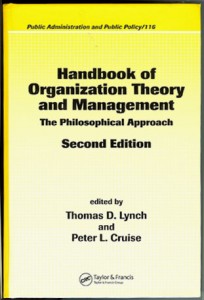Handbook of Organization Theory and Management the Philosophical Approach
Handbook of Organization Theory and Management The philosophical Approach
 ISBN: 0-8247-0113-5
ISBN: 0-8247-0113-5
Copyright c 1998 by MARCEL DEKKER, INC. All rights Reserved.
PREFACE
This book is addressed to uniting philosophy and public administration. Few subjects are more influenced by philosophy than the form of governance a public selects to guide and administer its public affairs. Yet, the literature has been strangely silent about the relationship between the two-until now. It is our hope that this book will inspire many more efforts to explore this most important of relationships, especially because the real work has only just begun. At the dawn of a new millennium, it is particularly appropriate to build such bridges from the past to the future and to rediscover our roots while contemplating our intellectual progress.
The history of this project began while Thomas D. Lynch, the senior editor, was teaching a graduate seminar at Florida Atlantic University. The course required students to examine the philosophical and epistemological foundations of modern organizational and political theory. Students loved the seminar as if opened their eyes to a much larger world than traditional courses in organization theory typically covered. The understanding that public administration’s current tasks and ideas are relevant to the most sophisticated work in intellectual history is always a remarkable discovery, and to integrate those ideas with modern approaches to organizational management is an enlightening process. However, Dr. Lynch was frustrated by the lack of integrated literature on this subject. Todd J. Dicker, one of Dr. Lynch’s brightest Ph.D. students in this seminar, was kind enough to join this massive project, which took over three years to complete.
The process of recruiting chapter contributors began by carefully scanning the body of literature to identify potential authors. A great deal of effort was devoted to identifying potential authors who had already made significant contributions to the literature on their topics and had established reputations as thinkers and scholars. The editors are extremely proud of the caliber of those authors who have contributed to this volume and the extraordinary quality of their contributions.
A very pleasant addition to his project was Lisa Pelosi at Marcel Dekker, Inc. Under her gentle and positive prodding, the project kept moving along on schedule. Thanks are necessary to Ms. Pelosi, who also had the challenge of copy editing the manuscript. In addition, Mrs. Shirley DeJean, Secretary of the public Administration Institute at LSU. deserves thanks.
A special thank you must go to Richard Omdal, Dr Lynch’s voluntary graduate assistant, who deserves to be singled out. Mr. Omdal, now Ph.D. student, worked for Dr. Lynch without compensation. His tireless management of a large number of manuscripts and mountain of correspondence, especially during the summer months while Dr. Lynch was traveling, eased the lengthy process of completing this project. His useful observations and comments greatly improved the overall quality of the manuscript.
Finally, Todd would like to thank Tom Lynch for originally igniting his interest in philosophy and epistemology, and for adding tinder to the fire by inviting him to participate in this project. The experience of combining so many individual’s efforts into a cohesive work has left a deep and lasting impression on his thoughts and vision of how out epistemology has evolved through history into its current form.
Thomas D. Lynch
Todd J. Dicker
